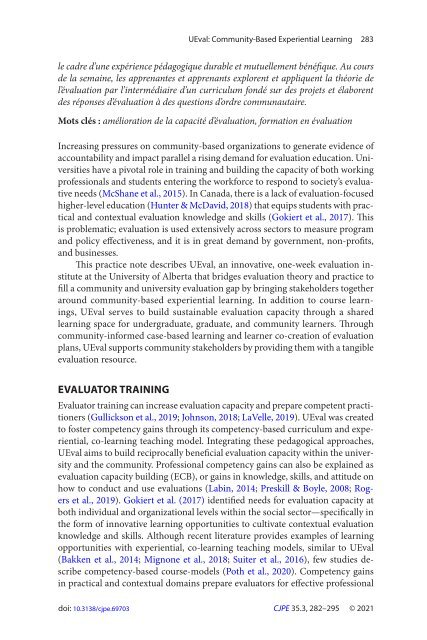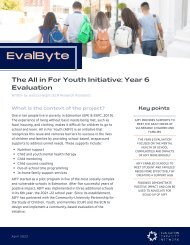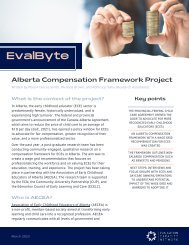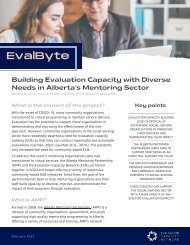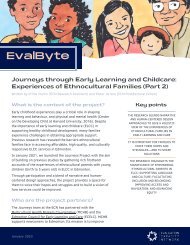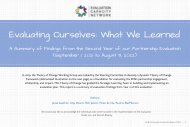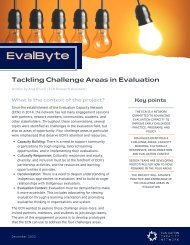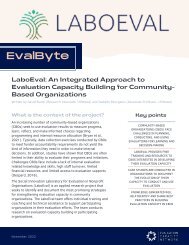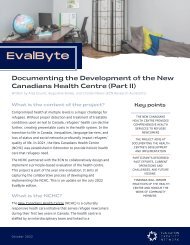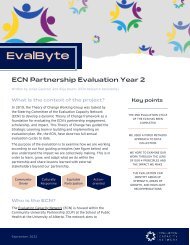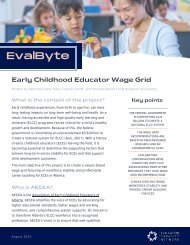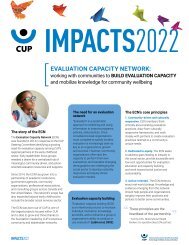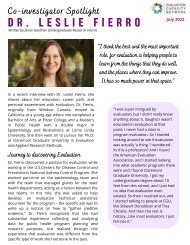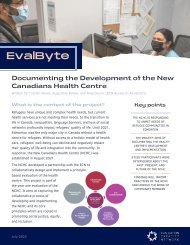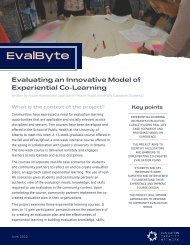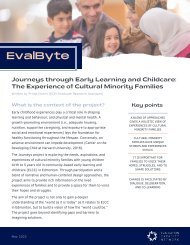UEval: Bringing Community-Based Experiential Learning to the Evaluation Classroom
You also want an ePaper? Increase the reach of your titles
YUMPU automatically turns print PDFs into web optimized ePapers that Google loves.
<strong>UEval</strong>: <strong>Community</strong>-<strong>Based</strong> <strong>Experiential</strong> <strong>Learning</strong> 283<br />
le cadre d’une expérience pédagogique durable et mutuellement bénéfique. Au cours<br />
de la semaine, les apprenantes et apprenants explorent et appliquent la théorie de<br />
l’évaluation par l’intermédiaire d’un curriculum fondé sur des projets et élaborent<br />
des réponses d’évaluation à des questions d’ordre communautaire.<br />
Mots clés : amélioration de la capacité d’évaluation, formation en évaluation<br />
Increasing pressures on community-based organizations <strong>to</strong> generate evidence of<br />
accountability and impact parallel a rising demand for evaluation education. Universities<br />
have a pivotal role in training and building <strong>the</strong> capacity of both working<br />
professionals and students entering <strong>the</strong> workforce <strong>to</strong> respond <strong>to</strong> society’s evaluative<br />
needs (McShane et al., 2015). In Canada, <strong>the</strong>re is a lack of evaluation-focused<br />
higher-level education (Hunter & McDavid, 2018) that equips students with practical<br />
and contextual evaluation knowledge and skills (Gokiert et al., 2017). This<br />
is problematic; evaluation is used extensively across sec<strong>to</strong>rs <strong>to</strong> measure program<br />
and policy effectiveness, and it is in great demand by government, non-profits,<br />
and businesses.<br />
This practice note describes <strong>UEval</strong>, an innovative, one-week evaluation institute<br />
at <strong>the</strong> University of Alberta that bridges evaluation <strong>the</strong>ory and practice <strong>to</strong><br />
fill a community and university evaluation gap by bringing stakeholders <strong>to</strong>ge<strong>the</strong>r<br />
around community-based experiential learning. In addition <strong>to</strong> course learnings,<br />
<strong>UEval</strong> serves <strong>to</strong> build sustainable evaluation capacity through a shared<br />
learning space for undergraduate, graduate, and community learners. Through<br />
community-informed case-based learning and learner co-creation of evaluation<br />
plans, <strong>UEval</strong> supports community stakeholders by providing <strong>the</strong>m with a tangible<br />
evaluation resource.<br />
EVALUATOR TRAINING<br />
Evalua<strong>to</strong>r training can increase evaluation capacity and prepare competent practitioners<br />
(Gullickson et al., 2019; Johnson, 2018; LaVelle, 2019). <strong>UEval</strong> was created<br />
<strong>to</strong> foster competency gains through its competency-based curriculum and experiential,<br />
co-learning teaching model. Integrating <strong>the</strong>se pedagogical approaches,<br />
<strong>UEval</strong> aims <strong>to</strong> build reciprocally beneficial evaluation capacity within <strong>the</strong> university<br />
and <strong>the</strong> community. Professional competency gains can also be explained as<br />
evaluation capacity building (ECB), or gains in knowledge, skills, and attitude on<br />
how <strong>to</strong> conduct and use evaluations (Labin, 2014; Preskill & Boyle, 2008; Rogers<br />
et al., 2019). Gokiert et al. (2017) identified needs for evaluation capacity at<br />
both individual and organizational levels within <strong>the</strong> social sec<strong>to</strong>r—specifically in<br />
<strong>the</strong> form of innovative learning opportunities <strong>to</strong> cultivate contextual evaluation<br />
knowledge and skills. Although recent literature provides examples of learning<br />
opportunities with experiential, co-learning teaching models, similar <strong>to</strong> <strong>UEval</strong><br />
(Bakken et al., 2014; Mignone et al., 2018; Suiter et al., 2016), few studies describe<br />
competency-based course-models (Poth et al., 2020). Competency gains<br />
in practical and contextual domains prepare evalua<strong>to</strong>rs for effective professional<br />
doi: 10.3138/cjpe.69703<br />
CJPE 35.3, 282–295 © 2021


